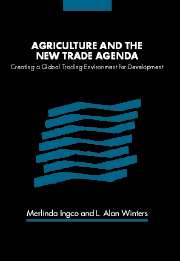Book contents
- Frontmatter
- Contents
- List of figures, tables, and boxes
- List of contributors
- Preface
- List of abbreviations
- 1 Introduction
- 2 Agriculture and the trade negotiations: a synopsis
- Part I Experience and lessons from the implementation of WTO agreements
- Part II Interests, options, and objectives in a new trade round
- Part III New trade rules and quantitative assessments of future liberalization options
- Part IV New trade issues and developing country agriculture
- Author index
- Subject index
- References
2 - Agriculture and the trade negotiations: a synopsis
Published online by Cambridge University Press: 27 February 2010
- Frontmatter
- Contents
- List of figures, tables, and boxes
- List of contributors
- Preface
- List of abbreviations
- 1 Introduction
- 2 Agriculture and the trade negotiations: a synopsis
- Part I Experience and lessons from the implementation of WTO agreements
- Part II Interests, options, and objectives in a new trade round
- Part III New trade rules and quantitative assessments of future liberalization options
- Part IV New trade issues and developing country agriculture
- Author index
- Subject index
- References
Summary
Agricultural trade policy is notorious for its complexity – indeed, many would argue that complexity is a key tool in preserving it from prying eyes and peremptory reform. This book is similarly complex, so in the interests of transparency we offer in this chapter a synopsis of the arguments it covers. The remainder of the book comprises four parts. Part I contains three chapters (chapters 3–5) primarily concerned with the operation of the Uruguay Round Agreement on Agriculture (URAA), which sets the scene for the new round. This is followed by the two chapters in part II (chapters 6 and 7) which identify the commonalities and differences in interest both between developed and developing countries and, more importantly, between developing countries. Part III contains seven studies (chapters 8–14) aimed at quantifying the scope for, and benefits from, agricultural trade policy reform, and analyzing the relative benefits of different reform packages that might emerge from negotiation. The part deals, inter alia, with tariff rate quotas, specific commodity markets, broad reform packages and the economy-wide effects of reform. Part IV (chapters 15–21) of the book considers “new” issues: some chapters review the unfinished agenda of the URAA's “new” issues, such as sanitary and phytosanitary standards (SPS) and intellectual property (IP), while others deal with “new new” issues such as the environment and genetically modified foods.
- Type
- Chapter
- Information
- Agriculture and the New Trade AgendaCreating a Global Trading Environment for Development, pp. 16 - 34Publisher: Cambridge University PressPrint publication year: 2004



